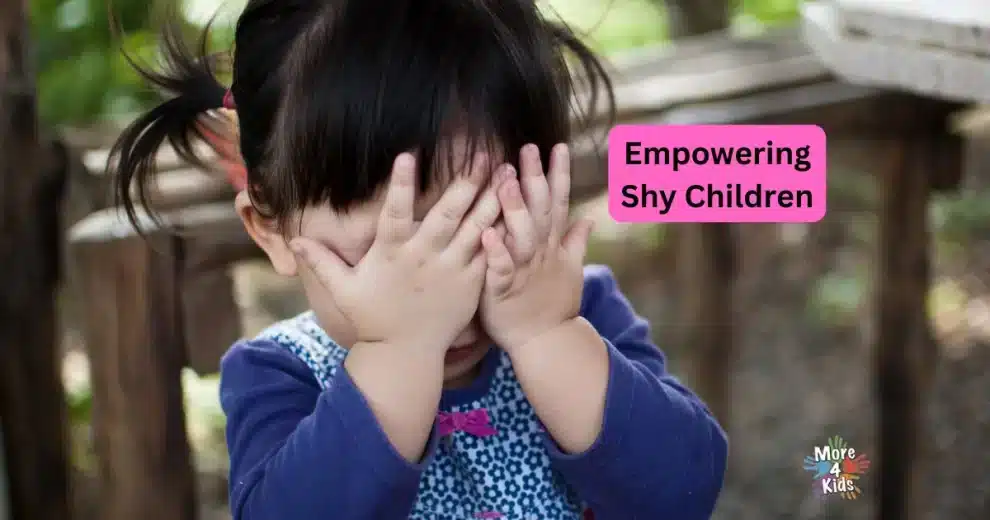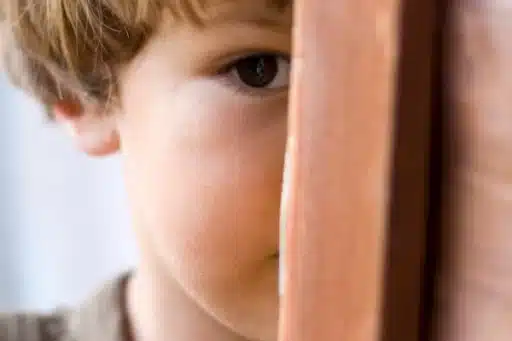I was a very shy child and still vividly remember my first day at kindergarten, even though it’s been decades. Before that, I don’t remember playing with children other than my brothers and sisters. My school didn’t have a preschool, and I lived in a small rural town where no other children lived next door.
That first day in kindergarten, although I didn’t know the words for it, I was feeling extremely shy and awkward. I didn’t speak a word to anyone and played in the corner until an outgoing girl approached me and asked me if I wanted to play. I gratefully accepted, and she became my best friend until she moved away at the end of eighth grade.
When I became a parent, I made it a high priority to help my young children, who were already showing signs of shyness, learn to feel comfortable socializing. So, we worked on it throughout the years, and while they can both still show signs of shyness in certain situations, my daughter was selected as the homecoming representative for her high school class last year, and my son just managed to make a staggering number of friends in his first week at college. Here are some of my top tips for helping your introverted kid become more social.
Explain That Everyone is Different
Table of Contents
I remember not understanding how my new kindergarten friend and others like her in our class felt comfortable speaking to people they didn’t know. I was probably the shyest one in my class, and, at times, I felt like something was wrong with me. It can help your child if they understand that some other kids – and even adults – feel the same way they do, too.
Point Out That No One Else is Noticing Their Shyness
When you’re a shy kid, you feel as if everyone is looking at you, noticing your discomfort, and judging you for it. As you get older, you realize that’s not true at all – most kids are way too self-involved with their own world to pay attention to what another kid is feeling or thinking.
I constantly reminded my children that even when they felt awkward and embarrassed in social situations, it was almost a certainty the other kids hadn’t picked up on it. That can be an incredible relief and make your child feel less self-conscious.
Realize It’s a Skill That Needs to Be Practiced
It helps to explain to your child that being social can take practice and won’t feel as natural for some children as it does for others. My kids were both in the school band, and I pointed out how hard a simple song was for them to master in the beginning. With lots of practice, they were able to begin playing more confidently, and it wasn’t long before playing their instruments felt completely natural. Being social can feel the same way – once you begin doing it, you feel more comfortable with it.
To help my kids get over the anxiety a person can get by putting themselves out there emotionally, I often asked them to think about the worst-case scenarios. So, for instance, if they were going to ask an
acquaintance if they wanted to come over to our house and play basketball with them in our driveway and they were stressed out about it, what is the worst-case scenario that could happen? The kid telling them no was usually the worst-case scenario we could come up with. But the best thing that could happen would be finding a new friend. That was always worth the risk of potentially being told no.
Focus on Small Improvements
When my kids were little and at their shyest, I would ask them to do one small thing to expand their circle. That might be smiling at someone, asking someone to eat lunch with them, or playing with someone different at recess. We focused on the small things because they weren’t as scary as big gestures. Sure enough, those baby steps snowballed with time, and before long, they began to feel more comfortable in social settings.
Make Friends With Other Parents
It’s not the same world it used to be. When I was a kid, parents didn’t need to know each other for their children to become friends and spend time together, but with the safety concerns in today’s world, that has changed. Many parents don’t feel comfortable with their child going to a friend’s house unless they know the parents – and that’s understandable.
It can help if you try to make friends with the parents of your child’s classmates. You’ll be modeling solid social skills for your child, and you may be able to help arrange some playdates and social situations that will help your child stretch their wings and become more comfortable with others.
Realize You Don’t Always Understand
When we reached my kids’ teen years, some of my advice about expanding their social circles wasn’t always warmly received by them. When I suggested they should send an acquaintance a message on social media and see if they wanted to hang out, they looked at me like I had just announced I was an alien. They both informed me that kind of interaction would be viewed as weird.
At first, I thought they were overreacting, but then I took a step back and considered their point of view. I had to admit that the rules of being social have changed since I was a teenager. So, I respected their point of view anytime I made an old-school suggestion they thought wouldn’t work.
As you try to help your child navigate these social challenges, it’s best to remember that it’s okay to give encouragement and gentle nudges, but you should avoid pushing them into anything they’re not yet ready to handle. Learning to be social can be a marathon, not a sprint, and there’s nothing wrong with that.
More Tips For A Shy Child: Nurturing Social Skills Across Different Age Groups
Navigating the social maze isn’t a one-size-fits-all kind of deal. What works for one child may not work for another. Below we break down teaching kids social skills by age group.
Toddlers (1-3 Years)
Learning Through Play
At this age, social skills are all about learning through play. Encourage your toddler to share toys and take turns. Playdates can be a great way to introduce these concepts. Remember, it’s never too early to start!
 Preschoolers (4-6 Years)
Preschoolers (4-6 Years)
The Magic of ‘Please’ and ‘Thank You’
Manners matter, even for the little ones. Teach your preschooler the importance of saying ‘please’ and ‘thank you.’ Trust me, it goes a long way in making them more likable among their peers and adults alike.
Early School Age (7-9 Years)
Friendship 101
This is the age when friendships start to become more meaningful. Encourage your child to invite friends over for playdates or sleepovers. Lily loves hosting tea parties, and it’s a hit with her friends too!
Preteens (10-12 Years)
The Art of Conversation
Max is at this stage where he’s learning to hold a conversation that goes beyond just talking about video games. Encourage your preteen to discuss various topics, be it sports, books, or current events. It’s all about broadening those horizons.
Teens (13-18 Years)
Navigating the Social Media Maze
Ah, the teen years. Social media becomes the new playground, and it’s not always easy. Teach your teen the do’s and don’ts of online interaction. Remind them that the rules of kindness and respect apply online just as much as they do offline.
Table: Social Activities to Boost Your Child’s Social Skills
| Activity Type | Benefits | Suitable Age Group |
|---|---|---|
| Playdates | One-on-one interaction, sharing | 3-12 years |
| Team Sports | Teamwork, communication | 5-18 years |
| Art & Craft Classes | Creativity, patience, focus | 4-16 years |
| Music Lessons | Discipline, self-expression | 5-18 years |
| Drama Club | Confidence, public speaking | 7-18 years |
| Nature Walks | Observation, curiosity | All ages |
| Cooking Together | Following instructions, sensory experience | 4-18 years |
| Board Games | Strategy, patience, taking turns | 4-18 years |
| Storytelling | Imagination, vocabulary | 3-12 years |
| Community Service | Empathy, responsibility | 8-18 years |
Additional Resources
For more information, check out these authoritative articles and studies:
- Child Development and Social Skills – CDC
- The Importance of Socialization for Kids – U.S. Department of Education
Frequently Asked Questions
What’s the difference between introversion and shyness?
Introversion is a personality trait where a person prefers solitude and finds social interactions draining. Shyness, on the other hand, is a feeling of discomfort or apprehension in social situations. An introverted person may not necessarily be shy.
How can I help my shy child make friends?
Start by encouraging small social interactions, like saying hello or sharing a toy. Gradually work up to more complex social situations, like playdates or group activities.
Is it normal for kids to be shy?
Yes, it’s completely normal. Many children go through phases of shyness, especially when they are exposed to new situations or people.
Can shyness be overcome?
Absolutely. With the right support, guidance, and practice, a child can learn to manage their shyness and become more comfortable in social settings.
How can I teach my child to be more confident?
Confidence comes with mastery. Encourage your child to engage in activities they enjoy and are good at. Celebrate their achievements, no matter how small, to boost their self-esteem.
Should I force my shy child to socialize?
Forcing a child into social situations can backfire and make them more anxious. Gentle encouragement is usually more effective.
How can parents model good social behavior?
Parents can model good social behavior by interacting positively with others, showing empathy, and demonstrating good listening skills.
What are some good social skills activities for kids?
Team sports, group art projects, and interactive games are excellent ways for kids to practice social skills.
How do I handle my child’s social anxiety?
Consult a healthcare provider for a proper diagnosis and treatment plan. Cognitive-behavioral therapy (CBT) is often recommended for treating social anxiety.
Where can I find more resources on child social development?
Websites of reputable organizations like the CDC and the U.S. Department of Education offer valuable resources. Books on child psychology and parenting can also be helpful.








 Preschoolers (4-6 Years)
Preschoolers (4-6 Years)





Add Comment